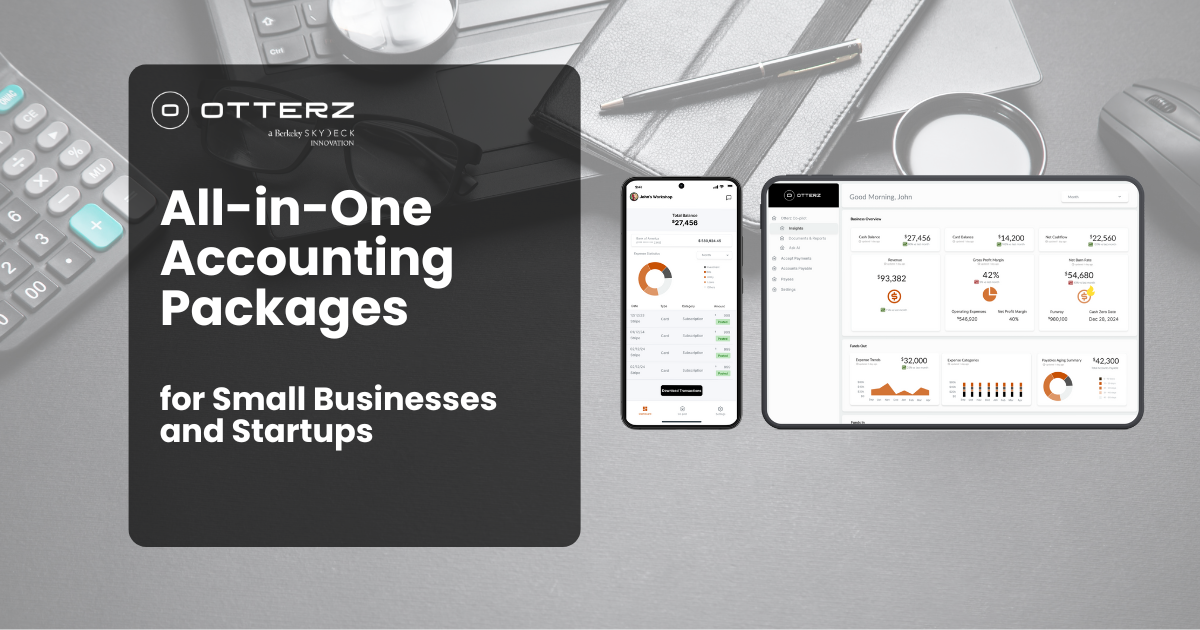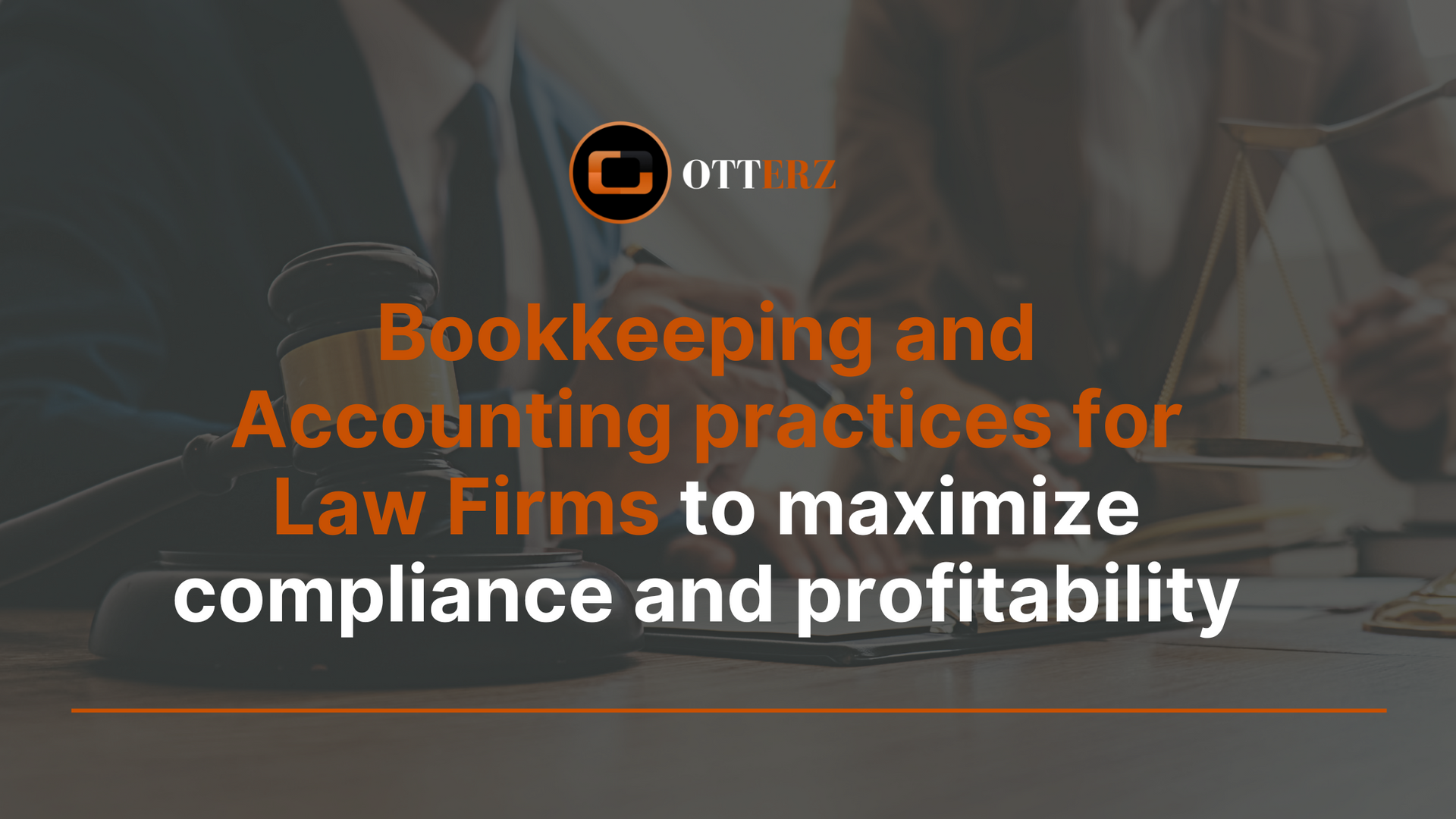The Otterz Guide to Accrual Accounting for C-Corporations
"It's the little details that are vital. Little things make big things happen."
John Wooden
In this Article:
Part 1: Introduction to Accrual Accounting for C-Corporations
- Definition of Accrual Accounting
- Fundamental Principles of Accrual Accounting
- Examples of Accrual Accounting
- Understanding Accrual vs. Cash Basis Accounting
- Why Accrual Accounting Is Crucial for C-Corporations
- How Otterz Can Facilitate the Transition
- Advantages of Accrual Accounting for C-Corps
Part 2: Key Components of Accrual Accounting
- Revenue Recognition
- Expense Reporting
- Inventory Management
- Depreciation and Amortization
- Accruals and Deferrals
Part 3: Challenges and Considerations of Accrual Accounting for C-Corps
- Complexity in Implementation
- Need for Robust Systems
- Audits and Compliance
Part 4: How to Implement Accrual Accounting in a C-Corp
- Initial Setup and Transition
- Choosing the Right Tools and Software
- Training and Resources
Conclusion
Part 1: Introduction to Accrual Accounting for C-Corporations
Accrual accounting is a fundamental accounting method that is instrumental for businesses that need to manage their financial affairs with a high degree of precision. Unlike cash basis accounting, which records transactions only when cash is received or paid, accrual accounting captures financial events based on economic activity rather than cash flow. This approach aligns more closely with the true financial condition of a company at any given time.
1. Definition of Accrual Accounting
At its core, accrual accounting involves recognizing revenues and expenses when they are incurred, irrespective of when cash transactions actually occur. This method adheres to the accounting principles of revenue recognition and expense matching, which are crucial for providing a clear and accurate picture of a company’s financial performance and position.
2. Fundamental Principles of Accrual Accounting
- Revenue Recognition: Under accrual accounting, revenues are recognized when earned, not when received. This means that a company records income in its books at the time the sale is made or the service is delivered, regardless of whether cash has been exchanged. This principle ensures that revenue is matched with the expenses incurred to generate that revenue within the same accounting period, providing a real reflection of profitability.
- Expense Matching: This principle dictates that expenses should be recorded in the same period as the revenues to which they relate, regardless of when the payment for the expenses is made. By matching expenses with revenues, accrual accounting allows businesses to more accurately gauge the economic outcomes of their operations during a specific period.
3. Examples of Accrual Accounting
To better illustrate how accrual accounting works in practice, consider the following scenarios:
- Scenario 1: Revenue Recognition: A C-Corporation in the manufacturing sector finishes producing a large order of goods in late December but doesn’t receive payment until January. Under accrual accounting, the revenue from this order is recognized in December’s financial statements, reflecting the completion of the sales transaction in the fiscal year it was fulfilled.
- Scenario 2: Expense Matching: The same corporation pays for raw materials in November to prepare for a large production cycle in December. Even if most of these materials are not used until December, the expense is recognized in December when the associated revenue from selling the manufactured goods is also recognized. This matching principle ensures the financial results reflect the true costs related to the revenues of that period.
These examples demonstrate how accrual accounting provides a more accurate and timely picture of a company's financial situation, which is crucial for internal management and external reporting.
4. Understanding Accrual vs. Cash Basis Accounting
How income and expenses are recorded can significantly influence the financial insights a business gains from its financial statements. Accrual bookkeeping is a method that records revenues and expenses when they are earned or incurred, regardless of when the cash transactions actually occur. This approach contrasts sharply with cash basis accounting, where transactions are only recorded when cash changes hands. While cash basis might seem straightforward and is often favored by smaller businesses for its simplicity, it can provide a limited view of a company's financial health, especially as the business grows.
Accrual accounting, on the other hand, offers a more comprehensive and accurate depiction of a company’s financial status. This method accounts for revenues that have been earned but not yet received, and for expenses that have been incurred but not yet paid. For instance, if a C-Corporation invoices a client in one fiscal period but doesn't receive payment until the next, accrual accounting allows the revenue to be recognized in the period in which the invoice was issued. This timing difference is crucial for businesses to manage their financials more effectively, aligning income with related expenses in the appropriate periods.
| Criteria | Accrual Accounting | Cash Basis Accounting |
|---|---|---|
| Recognition of Revenue | Recognized when earned, regardless of when cash is received | Recognized when cash is received |
| Recognition of Expenses | Recognized when incurred, regardless of when cash is paid | Recognized when cash is paid |
| Compliance | Required if gross receipts exceeds > $26 million | Allowed for small businesses (average gross receipts ≤ $26 million) |
| GAAP Compliance | Complies with GAAP, providing standardized and comparable financial statements | Does not comply with GAAP |
| Financial Accuracy | Provides a more accurate picture of financial position and performance | Less accurate reflection of financial position |
| Complexity | More complex, requires a deeper understanding and detailed record-keeping | Simpler, easier to maintain |
| Example of Use | Used by large corporations, especially those with inventory, receivables, or preparing for IPO | Often used by small businesses and sole proprietors |
| Tax Implications | May result in different tax liabilities due to timing of income and expense recognition | Taxes are paid on actual cash received and expenses paid |
| Financial Adjustments | Requires adjustments for accrued expenses and revenues at year-end | Fewer year-end adjustments needed |
| Business Suitability | Suitable for businesses with complex transactions and long-term contracts | Suitable for simple, cash-based transactions |
Table 1: Comparison between Accrual and Cash Basis Accounting
5. Why
Accrual Accounting Is Crucial for C-Corporations
For C-Corporations, particularly those that are publicly traded or preparing for an IPO, accrual accounting isn’t just beneficial; it’s mandated under Generally Accepted Accounting Principles (GAAP). GAAP compliance not only enhances financial transparency but also ensures consistency and comparability between the financial statements of different companies. This level of standardization is essential for investors, regulators, and other stakeholders who rely on these documents to make informed decisions.
Moreover, C-Corporations engaged in complex transactions or those with significant amounts of inventory, receivables, or payables will find that accrual accounting provides the accuracy and detail required to manage business operations and strategic planning effectively.
It’s also worth noting that the IRS generally requires corporations with average annual gross receipts exceeding $26 million over the prior three tax years to use the accrual method of accounting. This requirement ensures that larger corporations report their financial activities more accurately, reflecting income when it is earned and expenses when they are incurred, rather than when cash is exchanged.
6. How Otterz Can Facilitate the Transition
At Otterz, we specialize in supporting businesses as they navigate the complexities of accounting systems. We understand the challenges involved in transitioning from cash to accrual bookkeeping. Our All-in-One Accounting Packages are designed to make this transition smooth and stress-free, providing you with the expertise and tools necessary to manage your accounting needs efficiently. By partnering with us, C-Corporations can ensure compliance with financial reporting standards while benefiting from an accounting system that offers greater clarity and control over their financial health.
7. Advantages of Accrual Accounting for C-Corps
Accrual accounting is not just a regulatory requirement for C-Corporations but also a strategic tool that offers numerous advantages, enhancing a company's financial management capabilities and compliance with established accounting standards. Here’s a detailed look at some of these benefits:
Accurate Financial Picture
Accrual accounting provides a more precise reflection of a company’s financial health by recording revenues and expenses when they occur, rather than when cash is exchanged. This method allows C-Corporations to:
- Track True Profitability: Accrual accounting aligns income and related expenses in the same period, giving a true picture of profitability. This is essential for understanding the effectiveness of business operations and can influence management decisions and strategies.
- Manage Revenue and Expenses More Effectively: By recognizing revenue at the point of sale and expenses when incurred, companies can manage their financials more accurately, making it easier to analyze trends and identify areas for improvement.
Compliance with GAAP
For C-Corporations, particularly those that are publicly traded or are planning to issue stock to the public, compliance with Generally Accepted Accounting Principles (GAAP) is mandatory:
- Enhanced Transparency and Reliability: GAAP compliance achieved through accrual accounting helps standardize financial reporting, making financial statements more transparent and comparable across different businesses. This reliability is crucial for investors, lenders, and other stakeholders who rely on these documents to assess the company’s financial status.
- Regulatory Requirements: Accrual-based accounting ensures that all financial reporting is up to date with current laws and regulations, reducing the risk of legal or financial penalties that can arise from non-compliance.
Improved Financial Management
The accrual method of accounting significantly enhances a corporation's ability to manage its finances effectively:
- Better Budgeting and Forecasting: With a clearer view of income and expenses as they occur, companies can forecast future financial conditions more accurately. This benefit is particularly important for long-term planning and for securing external financing, as it demonstrates fiscal responsibility and planning acumen.
- Cash Flow Management: Although accrual accounting focuses on earned revenues and incurred expenses, it also enables better cash flow management by providing insights into timing differences between actual cash flows and financial statement recognition. This can aid in more strategic decision making regarding payment schedules and investment planning.
- Decision Making:
Managers have access to comprehensive financial data that better reflects the company's operations and financial standing, enabling more informed decisions about investments, cost control, and potential expansions.
Part 2: Key Components of
Accrual Accounting
Accrual accounting involves several fundamental concepts that ensure the accuracy and reliability of financial reporting for C-Corporations. Understanding these components is essential for effectively implementing and benefiting from this accounting method.
1. Revenue Recognition
Revenue recognition under accrual accounting is based on the principle that revenue should be recognized in the accounting period in which it is earned, regardless of when the cash is received. This approach is governed by the following criteria:
- Earned Revenue: Revenue is considered earned when the product has been delivered or the service has been provided, completing the earnings process.
- Realizable Revenue: Revenue can only be recognized when it is reasonably certain that payment will be received.
- Matching Principle: Revenues are matched with expenses in the period in which the efforts that generated them are made.
For example, if a C-Corporation enters into a contract to provide consulting services over a six-month period, the revenue from this contract is recognized proportionally each month as the service is rendered, not when the invoice is paid.
2. Expense Reporting
In accrual accounting, expenses are recognized when they are incurred, not necessarily when they are paid. This is achieved through:
- Matching Expenses to Revenue: Direct costs associated with generating revenue are recognized in the same period as the revenue they help to produce. This matching ensures that financial statements accurately reflect the costs of generating income within the relevant period.
- Accrual of Expenses: Expenses that have been incurred but not yet paid, such as wages payable or utilities, are recorded in the period they relate to, ensuring that financial results are comprehensive and represent true obligations.
3. Inventory Management
Accrual accounting treats inventory as an asset until it becomes an expense. The process involves:
- Recording Purchases: Inventory purchases are recorded as assets, adding to the stock of goods available for sale.
- Cost of Goods Sold (COGS): When inventory is sold, the cost associated with that inventory is recorded as COGS, which is matched with the revenue from the sale of that inventory. This practice ensures that the expense directly related to the revenue is recognized in the same period as the revenue.
4. Depreciation and Amortization
These concepts allow a business to allocate the cost of a long-term asset over its useful life, reflecting the consumption of the asset:
- Depreciation: Tangible fixed assets like buildings and equipment are depreciated over their expected useful lives using methods such as straight-line or declining balance.
- Amortization: Intangible assets, such as patents and software, are amortized, spreading their cost over their useful lives according to the benefits they generate each period.
5. Accruals and Deferrals
Accruals and deferrals are accounting adjustments used to apply the matching principle effectively:
- Accrued Expenses: Expenses that have been incurred but not yet paid or recorded, such as interest on loans or wages for the last few days of the accounting period.
- Deferred Revenues:
Income received in advance for services which have not yet been performed or goods not yet delivered. This income is recorded as a liability until the revenue earning criteria are met.
Part 3: Challenges and Considerations of
Accrual Accounting for C-Corps
While accrual accounting offers numerous benefits for financial reporting and compliance, transitioning to and maintaining this system poses several challenges and considerations. Understanding these difficulties is crucial for C-Corporations to effectively implement and benefit from accrual accounting.
1. Complexity in Implementation
Transitioning from cash basis to accrual accounting is a significant change that involves a comprehensive understanding of the principles and requirements of the system:
- Training and Knowledge: Employees involved in financial processes need to be trained in accrual accounting principles, as these are more complex than those used in cash accounting. Understanding when and how to recognize income and expenses according to accrual rules is crucial.
- Adjusting Existing Records: The shift involves converting existing financial records to reflect accrual principles, which can be a meticulous and time-consuming process. This might involve recalculating revenue recognition dates, reclassifying certain expenses, or adjusting inventory records. From a GAAP perspective, businesses may be required to restate two years of financials to provide a comparative balance sheet.
- Cultural Shift: For businesses that have long used cash basis accounting, moving to accrual accounting requires a shift in company culture and mindset, where financial thinking needs to be oriented towards the timing of revenues and expenses rather than cash flows.
Additionally, there could be tax implications to changing from cash to accrual accounting. The IRS requires filing Form 3115, Application for Change in Accounting Method, to request and report this change. This process ensures compliance with tax regulations and helps manage any resulting tax liabilities or adjustments.
2. Need for Robust Systems
Accrual accounting requires sophisticated accounting systems and tools to manage the complexities of tracking and reporting financial data:
- Software Requirements: Advanced accounting software is necessary to handle the detailed tracking of receivables, payables, inventory management, and financial projections that accrual accounting demands. These systems need to be capable of generating timely reports that comply with accounting standards.
- Integration Capabilities: The chosen software should integrate seamlessly with other business systems (like CRM, ERP, and inventory management) to ensure all data relevant to financial reporting is accurately captured and reflected in real time.
- Professional Expertise: Hiring or consulting with accounting professionals who have a deep understanding of accrual accounting. These experts can ensure that the transition is smooth, compliance is maintained, and the financial reporting is accurate and meaningful.
3. Audits and Compliance
Even if not mandatory, to ensure the integrity and accuracy of financial reporting, regular audits and compliance checks are recommended:
- Internal Controls: Establishing strong internal controls to monitor and manage the accrual accounting processes is crucial. These controls help prevent errors and fraud in financial reporting.
- Audit Readiness: Regular internal and external audits are required to verify the accuracy of financial statements. Being audit-ready ensures that a C-Corp can defend its financial records and comply with regulatory requirements.
- Ongoing Compliance: Staying updated with changes in accounting standards and regulations is critical. Continuous education and adaptation are needed to ensure that a C-Corp’s financial practices remain compliant with evolving standards.
Part 4: How to Implement
Accrual Accounting in a C-Corp
Implementing accrual accounting in a C-Corporation is a significant step that can enhance the accuracy of financial reporting and ensure compliance with regulatory standards. This process involves several crucial steps, from the initial setup to the selection of the right tools and ensuring that your team is adequately trained.
1. Initial Setup and Transition
Transitioning from cash to accrual accounting requires careful planning and execution. Here are the key steps involved:
- Assessment of Current Accounting Practices: Begin by reviewing your current accounting system and practices. This assessment will help identify the major changes needed to shift to accrual accounting.
- Develop a Conversion Plan: Create a detailed plan that outlines how and when each part of your financial records will be converted to accrual accounting. This plan should include specific tasks, deadlines, and responsible parties.
- Adjusting Entries: Make the necessary adjusting entries to convert your financial statements from cash basis to accrual basis. This typically involves recognizing receivables, payables, and prepayments that were not previously recorded under cash accounting.
- Set Up a Chart of Accounts: Ensure that your chart of accounts is set up to support accrual accounting, allowing for the proper categorization of assets, liabilities, revenues, and expenses.
- Documentation and Policies:
Update or develop accounting policies and documentation to reflect accrual methods. Clear documentation is crucial for maintaining consistency and for audit purposes.
2. Choosing the Right Tools and Software
Selecting the appropriate accounting software is vital for effective accrual accounting management:
- Accrual Accounting Capabilities: Choose software that specifically supports accrual accounting, including features for managing accounts receivable, accounts payable, and expense recognition.
- Integration Features: Look for tools that can integrate with other systems (such as payroll, inventory management, and CRM software) to ensure that all financial data is synchronized and accurate.
- Scalability and Support:
The chosen software should not only meet your current needs but also be scalable to accommodate future growth. Additionally, ensure that reliable support and updates are offered by the provider.
3. Training and Resources
Ensuring that your team is well-equipped to handle accrual accounting is essential for a smooth transition and ongoing success:
Training Programs: Invest in comprehensive training programs for your finance and accounting teams. They should understand the principles of accrual accounting, how to use the new software, and the implications of these changes on your financial reporting.
Hiring Qualified Accountants: Consider hiring or consulting with accountants who have expertise in GAAP and accrual accounting. These professionals can provide valuable insights, assist with the transition, and help maintain compliance with accounting standards.
Continuous Education: Accrual accounting and GAAP guidelines can evolve, so it’s important for your team to stay updated through workshops, courses, and relevant certifications.

How
Otterz
can help
transition to
accrual accounting
Accrual accounting is a robust framework that offers C-Corporations a realistic and detailed view of their financial health. By adopting this accounting method, businesses gain the ability to accurately track and manage their financial activities, ensuring that revenue and expenses are recorded in the periods to which they truly belong. This approach not only enhances financial transparency but also aligns with compliance requirements under Generally Accepted Accounting Principles (GAAP), which is crucial for C-Corporations, especially those that are publicly traded or planning for public offerings.
Importance of Professional Guidance
Transitioning to accrual accounting, while beneficial, involves complexities that require careful handling. To ensure compliance and effective implementation, it is imperative for C-Corporations to consult with accounting professionals who are well-versed in GAAP and accrual principles. These experts can provide valuable insights into the specific needs of your business, help navigate the complexities of accounting standards, and set up systems that provide the most accurate financial reporting.
All-in-One Accounting Packages from Otterz
At Otterz, we understand the challenges and opportunities that come with switching from cash to accrual accounting. Our All-in-One Accounting Packages are designed to support C-Corporations through this transition, offering comprehensive services that cover everything from initial setup and detailed documentation to regular compliance checks and financial reporting. By partnering with us, you leverage our expertise in accrual accounting to ensure that your financial operations are not only compliant but also optimized for your business’s success.
If you are considering the switch to accrual accounting, or if you need assistance refining your existing accrual processes, Otterz is here to help. Take advantage of our free consultation offer for C-Corps to discuss your specific accounting needs. Our team of experts is ready to provide you with tailored solutions that incorporate the benefits of our All-in-One Accounting Packages, ensuring a seamless and successful transition to accrual accounting.
Contact us today to learn more about how our services can enhance your financial clarity and contribute to your strategic business objectives. Make the move to better financial management with
Otterz – where your company’s financial integrity is our top priority.
Sources:
Bizmanualz. - What does deferred liability mean? Retrieved from
https://www.vintti.com/blog/deferred-tax-understanding-assets-and-liabilities/
(Accessed: 19 May 2024).
Bizmanualz. - What are common accounting methods? Retrieved from https://www.bizmanualz.com/improve-accounting/what-accounting-methods-small-business.html (Accessed: 19 May 2024).
FasterCapital. - Accrual accounting - Recognizing amounts for a clearer financial picture. Retrieved from https://fastercapital.com/content/Essential-resources-every-startup-should-know-about-accounting-and-bookkeeping.html (Accessed: 19 May 2024).
Forbes. - 3 Accounting Methods You Need To Know In 2024. Retrieved from https://www.forbes.com/advisor/business/accounting-methods/ (Accessed: 19 May 2024).
Happay. - Expense Accounting. Retrieved from https://happay.com/blog/expense-accounting/ (Accessed: 19 May 2024).
Investopedia. - Accounting for small businesses. Retrieved from https://www.investopedia.com/accounting-for-small-businesses-8419573 (Accessed: 19 May 2024).
Investopedia. - Why is deferred revenue listed as a liability on the balance sheet?. Retrieved from https://www.investopedia.com/terms/d/deferredrevenue.asp (Accessed: 19 May 2024).
Khatabook. - 10 types of liabilities in accounting. Retrieved from https://khatabook.com/blog/understanding-balance-sheet-with-examples/ (Accessed: 19 May 2024).
Procurify. - How to make the move from cash to accrual-based accounting. Retrieved from
https://www.procurify.com/blog/how-to-make-the-move-from-cash-to-accrual-based-accounting/
(Accessed: 19 May 2024).
About the Authors:

Ektaa Shah
CPA & Taxation Expert
Ektaa is a Certified Public Accountant with a Master’s in Taxation, driven by a wealth of expertise and a commitment to excellence. Demonstrating dedication to academic and professional achievement, Ektaa has gained valuable experience across diverse industries, including professional service firms, life sciences and consumer goods. Serving as a tax specialist on audits and serving as a tax advisor for small to medium sized-businesses, she developed a deep understanding of complex tax issues. Beyond her professional endeavors, Ektaa is actively involved in community service and leadership. She proudly serves as the Treasurer on the Board of Directors for the non-profit organization Womanspace, demonstrating her commitment to giving back and empowering others.

Daniel Ionescu
Marketing Expert
Daniel is an Experienced Marketing Expert deeply passionate about financial technologies, startups, and small business growth. He is dedicated to empowering startups and small businesses through insightful content and innovative tools designed to enhance financial management and operational efficiency. Daniel is committed to delivering valuable, tech-driven solutions to entrepreneurs and business owners.
Found this valuable? Share it with your friends and colleagues!








